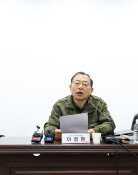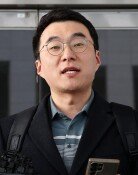[Diplomatic News] American Organization More Pro-Korean Than Some Koreans
[Diplomatic News] American Organization More Pro-Korean Than Some Koreans
Posted July. 22, 2005 06:11,
There was an occasion when President Roh Moo-hyun evoked a fierce controversy during his visit to Turkey in April by saying that people more pro-American than Americans themselves make the Korea-U.S. alliance difficult. Then what about the United States? Would there be an American more pro-Korean than Koreans are?
The organization that comes to mind right away is The Korea Society (TKS) in New York, which boasts of its almost half-century history. If there is a TKS in New York, there is the Korea Economic Institute (KEI) (president: Joseph Winder) in Washington.
KEI-
The KEI is located only three blocks away from the heart of the United States: the White House. It is often picked as a center of Korea-U.S. exchanges which Korean VIPs never forget to visit or get help from when they visit Washington.
The KEIs purpose is to grasp trends and collect and analyze data on Korea-U.S. economic relations and media reports on Korea made within the U.S.; hold Korea promotion events; and publish promotion information on the Korean economy. Concerning the recent three years, it was hectic dealing with politics, diplomacy, and security as Korea-U.S. relations and the North Korea nuclear problem arose as main subjects of interest.
The KEIs merit lies in its special gatherings in which influential Koreans, persons within American political, administration, academic circles, and think-tank experts meet and exchange opinions. The number of special gatherings held by the KEI this April to June alone total 28, which comes out to about two events a week.
GNP Chairwoman Park Geun-hye and other politicians from the ruling and opposition parties, former and incumbent foreign ministers Yoon Young-kwan and Ban Ki-moon, and NSC deputy chief Lee Jong-suk have met numerous American figures thanks to the good offices of the KEI. On the U.S. side, Assistant Secretary of State Evans Revere and Director for Korean affairs James Foster attended the gatherings.
The secret weapon of the KEI is a list of 8,000 leading Korea figures. The KEIs finance and publications director Florence Lowe boasts that there is no institute like the KEI which has such a comprehensive, voluminous list of figures related to the Korean Peninsula.
For urgent gatherings, there are many occasions in which it only takes two or three days to send invitations and hold gatherings, which resembles the Korean trait of operating fast and faster.
Established as a non-profit organization by the Economic Planning Board of the Korean government in 1982, the KEI is registered by the U.S. Department of Justice as a foreign agent. With the change of its supervisor from the Korea Development Institute (KDI) to the Korea Institute for International Economic Policy (KIEP) in January 1990, the KEI is currently known as a KIEP branch in Washington.
Via the KIEP, the Korean government supports the KEIs entire two billion won annual budget, and the promotional program of touring American universities is run with support money provided by the Korea Foundation.
The Korea Society-
Located in Manhattan, New York, The Korea Society (TKS) deals with subjects that cover politics, economics, culture, and North Korea issues.
TKSs major missions include inviting Black leaders to Korea, offering Korean history classes to history teachers of American schools, sponsoring lectures by Korean businessmen, and supporting the production of North Korea nuclear crisis-related broadcastings.
If the KEI in Washington concentrates on diplomacy and security issues, TKS is fully utilizing the characteristics of New York, the economic capital.
Although it was established in 1957, it would still be correct to say that Donald Greg (78), who served as the U.S. ambassador to Korea from 1989 to 1993, revived it as the face of Korea in the United States. He even declared that he would be a faithful spokesperson who promotes Korea in the U.S. at his inauguration.
In addition to the 800,000 dollar fund provided by the Korea Foundation, the strength of TKS is that public foundations and American companies centered in New York provide significant sponsorship. Public foundations, of course, and American companies which do business with Korea, including AIG, Boeing, Citigroup, and CBOL, sponsor TKS. Its annual budget is about $2 million.
Visiting Korea in June, former ambassador Greg visited the Federation of Korean Industries and it was reported that he said, Korean companies should increase the amount of their support. Director Sophia Kang of TKS said on July 20, It feels inconvenient that the proportion of Korean companies among the 75 to 80 corporate sponsors is low.
In particular, Greg was a staff member for former President George Bush when Bush was in charge of CIAs China affairs in the 70s and vice president in the 80s. This fact is Gregs power and at the same time, TKSs power.
TKS also has been building up sympathy with ambassador Park Gil Yon and his deputy Han Song Ryol of the North Korean Mission to the United Nations. Deputy representative Han, in particular, attended a golf event sponsored by TKS last year.
Soon-Taek Kwon Seung-Ryun Kim maypole@donga.com srkim@donga.com







